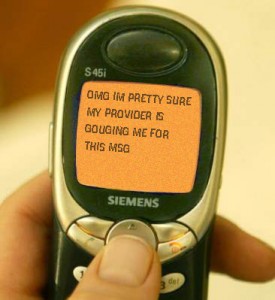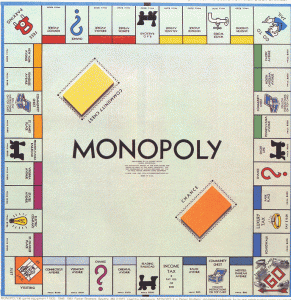 I don’t know about you, but this week’s NYTimes article “What Carriers Aren’t Eager to Tell You About Texting” written by local SJSU professor Randall Stross has me wanting to text him an emoticon smooch for his ‘lift and reveal’ article peeling back the Wizard of Oz curtain on mobile carrier costs, profit margins and taking advantage of youth habits to manipulate media prices!
I don’t know about you, but this week’s NYTimes article “What Carriers Aren’t Eager to Tell You About Texting” written by local SJSU professor Randall Stross has me wanting to text him an emoticon smooch for his ‘lift and reveal’ article peeling back the Wizard of Oz curtain on mobile carrier costs, profit margins and taking advantage of youth habits to manipulate media prices!
Over the entire 2008 year (ever since reading this Engadget mobile post) I’ve incredulously wondered WHY texting merits such overt price gouging!
It’s NOT a complex concept, nor a bandwidth hog, and ‘what the market will bear’ just seems manipulative and opportunistic in an age of 2.5 trillion text messages being sent worldwide, with projections of 3.3 trillion sent in 2009. (per the Gartner Group)
Yes, texting has been (and continues to be) a huge issue in my household…Obviously my gut instinct is more global on this one, as the chair of the antitrust subcommittee, Senator Herb Kohl got the ball rolling asking why American mobile carriers have doubled the price for text messages from 10 to 20 cents just as industry players merged from six biggies to four…Verrrrrrrrrrrrrrrrrry good question, ace!
NYTimes’ Stross reported that Senator Kohl invited Verizon Wireless, AT&T, Sprint and T-Mobile to answer some basic questions about their price leaps which uncorked a firestorm of inquiry along with 20+ class-action lawsuits around the country, as carriers seamlessly dodged the queries playing hide-n-seek on their revenue generation using ‘bundled plan’ gobbledygook like this:
“…the pay-per-use price of a message is relatively unimportant because most messaging is done as part of a package. With a $10 or $15 monthly plan for text messaging, customers of T-Mobile, AT&T and Sprint can effectively bring the per-message price down to a penny, if they fully use their monthly allotment…”
Um…er…that was NOT the question, folks.
The question is, how can a text file so small (the size of a Twitter message or Facebook status update in character count) cost so much when in fact there’s no good reason it SHOULD since transmission is a ‘free ride’ via technical operations of a wireless network and the teeny file size isn’t even a blip of a payload?
Mobile carrier execs love to toss around words like ‘finite spectrums’ and high costs involved with their ‘rights to use the wires’ etc. —But you might as well think ‘static snowstorm’ on the obfuscation front, as non-techie parents are duped into a blind lemming-style march of thinking:
‘Well, gosh, it must cost a lot to run that network thing, so my kid sure doesn’t need that new-fangled texting stuff, nosirreee…’
Sorry, gang. That just ‘ain’t the case.’
 Texting doesn’t cost squat to carriers, comparatively speaking…
Texting doesn’t cost squat to carriers, comparatively speaking…
Don’t be ‘sheeple’…make your decisions based on your own values and the reality of the situation, not media spins…
To me, parents that place a universal boycott on texting based on misinformation (e.g. ‘cost factors’ alone) is right up there with parental predator hype on social media networks, with those that cluck and vow to ‘never let their kids on MySpace or Facebook’ or whatever. Use those critical thinking skills, folks. There are pros and cons to ALL…
Mobile media appears to be burying their bones in the media misinformation graveyard, leveraging many adults’ lack of techno-knowledge, using revenue generators that fall onto the backs of teens…
In fact, Reddit has a humorously wry thread on this issue asking pointblank,
“Why does it cost 42 cents to mail a letter and 20 cents to send a text?”
The forum breaks through the analysis paralysis to identify the tangible labor costs and economics of ‘package delivery’ in human form, versus wireless ‘packages’ of freebie control channels, using double entendres that add insights and various points of view…
Also, another ‘hmn’ question for Senator Kohl to pursue surfaced on Gordon’s Notes blog asking about Apple iPhone’s SMS texting and the lack of ‘IM alternatives’…The ArsTechnica forum is in full tilt text-fest-fairness topic mode as well…
Meanwhile, for those of us who need the basic ‘texting wired world’ whys and hows explained succinctly, the NYTimes article does it quite well:
“A text message initially travels wirelessly from a handset to the closest base-station tower and is then transferred through wired links to the digital pipes of the telephone network, and then, near its destination, converted back into a wireless signal to traverse the final leg, from tower to handset. In the wired portion of its journey, a file of such infinitesimal size is inconsequential.”
Srinivasan Keshav, a professor of computer science at the University of Waterloo, in Ontario, said: “Messages are small. Even though a trillion seems like a lot to carry, it isn’t.”
So there ya have it folks…
 Stross’ article also does a great job putting some complicated concepts into laymen’s terms, explaining how the SMS texting ‘free ride’ works…
Stross’ article also does a great job putting some complicated concepts into laymen’s terms, explaining how the SMS texting ‘free ride’ works…
…In essence, the message needs to be within the length of the message used for internal communication between tower and handset to set up a call, and the open channel uses space whether or not a text message is inserted…
…Thus the ‘under 160 characters’ ‘short message service.’
“Once one understands that a text message travels wirelessly as a stowaway within a control channel, one sees the carriers’ pricing plans in an entirely new light.
The most profitable plan for the carriers will be the one that collects the most revenue from the customer: unlimited messaging, for which AT&T and Sprint charge $20 a month and T-Mobile, $15.”
 Now there’s an ‘aha’ moment for ME, who has spent many months ‘comparing text rate plans’ and doing the ring-around-the-rosie-who-has-what feature to make sense of it all, evaluating my household budget and “operating costs” commensurate with the media outlay.
Now there’s an ‘aha’ moment for ME, who has spent many months ‘comparing text rate plans’ and doing the ring-around-the-rosie-who-has-what feature to make sense of it all, evaluating my household budget and “operating costs” commensurate with the media outlay.
From Comcast cable monopolies to land lines, I go through ‘let’s shut it all off’ moments about every few weeks in ‘think what we’d save’ mode since the internet is the only conduit I really need!
Reuters reports nearly 18% of US households rely on wireless services only (no landlines) up several percentage points from a year earlier…so could THIS be why they need to make money on texting? Hmn…again, doesn’t make sense looking at the rev gen numbers… I’ve always given carriers the benefit of the doubt, thinking it must be ‘operating costs’ on their end somewhere….but the article nails that, too:
“Professor Keshav said that once a carrier invests in the centralized storage equipment – storing a terabyte now costs only $100 and is dropping – and the staff to maintain it, its costs are basically covered.
“Operating costs are relatively insensitive to volume,” he said. “It doesn’t cost the carrier much more to transmit a hundred million messages than a million.”
“UNTIL Senator Kohl began his inquiries, the public had no reason to think of the text-messaging business as anything but an ordinary one, whose operational costs rose in tandem with message volume. The carriers had no reason to correct such an impression.”
“Professor Keshav, whose academic research received financial support from one of the four major American carriers, discovered just how secretive the carriers are when it comes to this business…Two years ago, when he requested information from his sponsor about its network operations in the past so that his students could study a real-world text-messaging network, he was turned down.
He said the company liaison told him, “Even our own researchers are not permitted to see that data.”
 So much for transparency, people…
So much for transparency, people…
My guess is mobile execs will be ‘outed’ big time with very little wiggle room once the ‘walls come tumbling down.’
Gee, I’m shedding crocodile tears for the mobile media moguls…
Greed is NOT good, Gordon Gekko…Ah, such prescient irony…
P.S. To NYT Digital Domain writer Randall Stross…would you like to have a ‘cuppa tea’ sometime to tell me more of your findings since you’re local and all?
I’ve been listening to your NPR podcasts on cellphones vs. privacy and other media topics and an interview is in order for Shaping Youth! (not to mention your new book The Wizard of Menlo that posits Thomas Edison as the great grandfather of ipods!)
Leave a comment on the blog and I’ll text you my cellphone number to interview you in 2009!
p.s. And for those who missed the ’87 classic soliloquy of Michael Douglas as Gordon Gekko in the movie Wall Street…here’s a 3 min. clip …Might add it to your Netflix cue for financial literacy ‘teaching moments’ and then and now kids’ lessons in current affairs…
Visual Credits: Lead SMS texting photo via Engadget Mobile, We, the Sheeple from RockBox.org, (cool open source jukebox firmware for MP3 players) Monopoly Man, via ‘”Surefire strategies to win at Monopoly,” cartoon gecko from Leopard Gecko Guide.com (fun site, I love geckos, being from Hawaii!) 
Related Resources
AntiTrust & Competition Policy Blog: Innocent Until Proven Guilty, Or Not.
Text Messaging News: NYTimes Roundup of Recent Articles
Text Messaging Shorthand: Chat Acronymns from NetLingo
Congress Questions High Cost of Texting (CNET)
Wireless Carriers Counter Anti-Trust Concerns (RCR Wireless News)
Wireless Carriers Tell Senate Text Msg Rates Have Dropped; Imply Lawsuits Are Linked (Consumerist)
MuniWireless: Cost of Text Messaging Keeps Rising: $1310 per megabyte
VentureBeat Digital Media: Text Messaging Exposed As a Colossal Rip-Off
NewsFeed Researcher: Text Messaging Rates Questioned Again
Engadget Mobile: Is Our Wireless Infrastructure a House of High Speed Cards?








What an EXCELLENT blogget! Here are all the info is out there for people to find/see and yet no one seems to be complaining to the OLD FCC…perhaps the NEW FCC…I doubt it. The phone companies have far more clout than voters.
A ‘blogget?’ Is that a femme form of blogger? Or perhaps a short version of my usual verbosity? HNY, Bill…I’m very thankful for the NextNow collaboratory of digital gurus like you eager to make positive change in the ol’ world!
HNY, Bill…I’m very thankful for the NextNow collaboratory of digital gurus like you eager to make positive change in the ol’ world!
Here’s to a fine 2009!
It’s a great post Amy and you’re touching an industry nerve there – the last great cash cow of the communications sector.
On that note, as you allude to in your title, let’s hope 2009 scores results for the consumer – not just in telecoms but wherever young consumers are misunderstood, mistreated or undervalued by brands.
As ever, appreciative of your insights and good work at Shaping Youth.
GB
We rarely use text messaging, but pay for it as part of the plan to avoid fees, just in case.
Even more annoying, I pay an extra $40+/month for a Sprint Wireless card so that I can get my computer online. I’ve heard that cellphone companies deliberately disable cellphones so that they can’t provide wireless service, as they do in other countries.
Yup, I won’t shed a tear when this industry is brought in line.
@Graham: Coming from you, this is a particularly high honor to hear concurrence, for as you know I’m more of a ‘user’ of the gear than an insider techie…so I view the exploitation from a distorted lens (e.g. ‘real life experience’ vs. ops/hardware)
@Sandra: That’s an interesting ‘card’ option, never heard of that one…do you mean to synch data or to adapt a non-wireless computer to be a wireless one? (the latter of which shouldn’t be a monthly for sure!)
As far as texting goes, I started out a ‘meh’ no-need kinda gal, and now find it’s the primary communication device for my daughter to ‘check in’ sans peer influence/intrusion or editorial comment for that matter!
I mentioned on the Childhood Matters.org radio show when one of the Common Sense Media parents dissed it as superfluous that parents might want to keep an open mind and take more of a ‘wait and see’ approach to ALL media to see how it might integrate into their lives in a favorable way rather than blanket rejection…so I’m glad you have it ‘bundled’ just in case, down the line. (from power outages to lousy cell reception, it’s saved my hide many a time)
Also, on more than one occasion I’ve been privy to teens texting a ‘get me out of here’ call whether it’s a toxic sleepover/mean girl dynamic, a party gone awry or a date they want to bail on! (in fact, I’m the designated SOS parent pick up for OTHER OLDER S.Y. youth advisors that have non-texting ‘parental units.’) heehe…
(in fact, I’m the designated SOS parent pick up for OTHER OLDER S.Y. youth advisors that have non-texting ‘parental units.’) heehe…
I had long shunned text messages, even back 12 years ago when my in-bound txts were free, and out-bounds cost a dime. The comparative costs for voice vs. the bytes for text were evident to me (but then I am in IT).
These days, I keep getting texts from colleagues who assume I pay the extra $20 for the unlimited package. They base their assumption on the fact I have a teenager, so I must have the plan because he must text so much. They scratch their heads when I tell them my 13 year old’s cell phone has texting disabled.
I’ve started using joopz.com so I can at least cut down on my costs from those colleagues that still ‘don’t get it’.
As for the FCC: the entire phone market is closed to competition, which lets this tacit collusion of charging for bytes go unchallenged. Since the news media has made the term ‘deregulation’ as disquieting as any of George Carlin’s 7 dirty words, I doubt the incoming administration or FCC will be willing to consider helping the end-users have more choices.
(there I go again: sticking my head out from lurking, just to add my 2 cents)
Ah, Charlie…HNY! So glad you tossed out the invisibility cape to surface!
I think you weighed in on the summer cellphone contract post awhile back, where I was grappling with her overages, etc. Not sure if I ever reported the outcome, but it was part of the reason I softened my hardline…
She lost her phone completely for months, then earned back a prepaid ‘GO’ phone and monitored use down to the gnat’s eyebrow to prove she could…then she had to hold it there to self-monitor back to her ‘real’ phone to prove restraint/competence in the financial scheme of things, and then finally for Xmas her ‘only wish’ was for unlimited texting, which as you probably read, became a NEW media contract focal point…
I’m happy to say that yesterday, on New Year’s Day we signed a three-page, fully negotiated parent-child media AND behavioral ‘deal’ complete with debits/credits and ties to the financial literacy experiment I’m running on the chore chart focus of PayJr/VisaBuxx and iThryv/WeProsper online banking…(her Dad was a big fan of the ‘no need for ANY of it mindset as well—inc. media of all kinds, so he drove a pretty hard bargain, thus the back & forth over many mtgs. and family flaps)
We’ll see how she does…but right now, the ball (er, text) is in her court.
I may post the full ‘contract’ for fun, just to get youth and parental input, as it was a loooooooooong haul, and could be helpful to others?
As for the hilarious FCC/Carlin comment, I think you know we differ on the free market/enterprise bit in media/mktg. mining w/kids, as I DO feel deregulation resulted in full feature commercials in kids’ programming, and devolved from a content perspective into cheap, vapid ‘reality show’ group think, cramming commercialization into every nook and cranny while quality shows languished and got cancelled.
So, yah, that’s why I’m part of the product placement consortium asking the FCC to create clear divisions in what constitutes commercial content, regulate the blurred boundaries for wee ones, yadayada…I also feel phones are next on the spam-commercialism front tapping kids directly as much as they can, so I’m veeeeeeeeery reticent about the device in that regard…and yes, web/data/downloads etc. are not ‘part of the plan.’ (figuratively or literally)
Have you had much spam (other than your pals?) come to you via texting? Or mobile overall? Curious, as we’re looking into this with our teen teams…Great to hear from you…keep in touch and land a comment now and then, huh? Keeps me from babbling to myself…see you on Facebook! –a.
Great information about the economy, I enjoy your blog and look forward to more information.
Many teenagers have caught on to the text messaging communication craze. I’ve personally see this emerge in Europe a long time before the U.S.
Wanted to add an update for those who haven’t seen it in Time Magazine this month…
http://www.time.com/time/business/article/0,8599,1921373,00.html
Clearly, we ‘knew’ we knew…right?
98% profit from a 15 cent text? ouch.
Go unlimited then let’s see what the next move is! hmn…
.-= Amy Jussel´s last blog ..Bridging Generational Divides Through Music & Media =-.
I think that there should be a movement to allow parents to prevent texts from being sent in school. Like a time stamp kind of thing where students can’t text between 7 and 4pm
Interesting. From what I’m hearing on the street (and in the research) parents are some of the biggest offenders with interruption of the school day keeping in touch w/students—odd, it seems to me. Time stamp idea seems like a commons sense guideline/suggestion if teachers say it’s getting in the way of the day, but I don’t see ‘enforceability’ as viable…A whole diff approach would be to integrate use of SMS/mobile into edu/collab learning lessons in the classroom environs…But that’s a diff blog post.